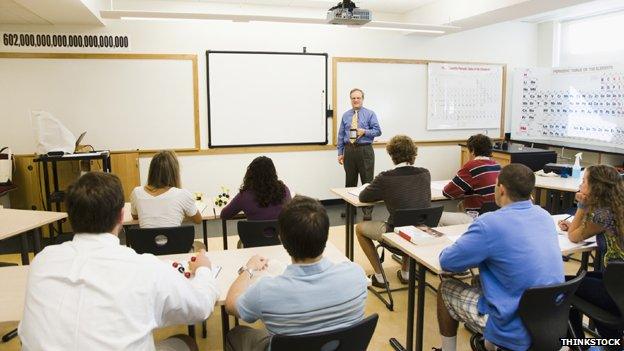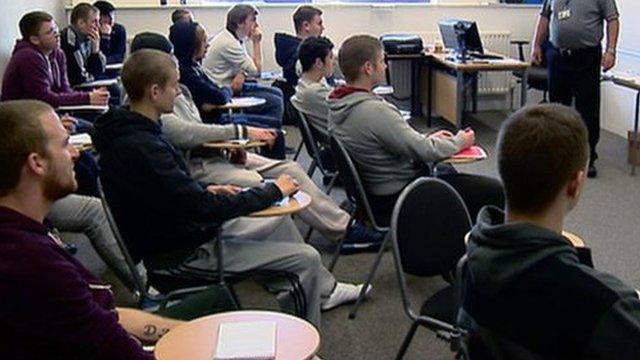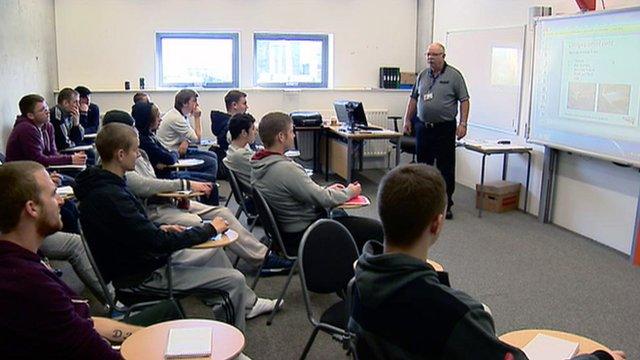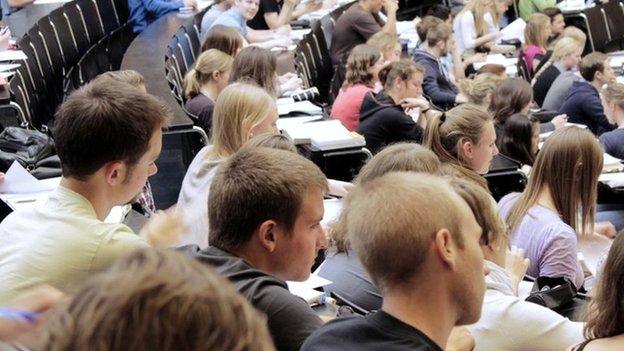MSPs question success of mergers at Scottish colleges
- Published

More information is needed before a major shake-up in Scotland's colleges can be judged a success, according to a committee of MSPs.
Scotland's colleges have merged in the past few years to create just 20 so-called "regional supercolleges".
Unions have warned about budget and job cuts, and there have been concerns about pay-offs at some institutions.
Holyrood's Public Audit Committee has raised a number of concerns about the impact of college mergers.
The committee chairman said the Scottish government and the Scottish Funding Council had not provided detailed figures to demonstrate efficiencies.
Colleges have gone through a big shake-up in recent years affecting budgets and staff, the structure of institutions and their very role within the education system.
They now focus primarily on full-time courses, mostly for young people, which lead to recognised qualifications.
Colleges had a budget of more than £580m in 2013-14. The amount they get from the Scottish government fell 12% in real terms over two years.
Between 2011 and 2014, the number of separate institutions fell from 37 to 20 through a series of mergers while the number of staff fell by 9%.
The Scottish government expects the reform programme to deliver £50m of efficiency savings each year from this financial year.
Among the concerns raised by the committee over the impact of college mergers were
The impact on staff and students
The handling of some severance payments
The accountability of arm's length foundations being used by colleges for certain assets
The two colleges that displayed "significant shortcomings" in their severance arrangements process were North College Glasgow and Coatbridge College.
The Public Audit Committee is still considering reports from the Auditor General on both these colleges.
Senior staff at the former Coatbridge College have been accused of colluding to give themselves overly generous severance payments before a merger.
The committee previously heard how £849,842 was paid to seven staff.
'Yet to be convinced' of savings
The chairman of the Public Audit Committee , Labour MSP Paul Martin, said: "We know that assessing costs and expected efficiency savings is a major challenge for mergers.
"The committee was assured by the Scottish government that the lessons identified by the Auditor General from previous public body mergers had been learned. So it is disappointing that the Scottish government and Scottish Funding Council have not yet been able to provide detailed figures to demonstrate efficiencies.
"The £50m figure for savings has frequently been referred to but we have yet to be convinced and we have sought clarity on the timescale for achieving this saving. Given the cost of the mergers and particular concerns around some severance payments made we have asked the Scottish government to provide greater detail on the merger costs and the achieved savings.
"Further, the committee understands why arm's length foundations are being used by colleges, but calls for greater transparency in how they are being used by extending FOI legislation to cover them.
"We acknowledge the Auditor General's finding that the merger planning process was generally good but we require more evidence of the benefits claimed."

Staff at the former Coatbridge College were accused of colluding to give themselves overly generous severance payments
A Scottish government spokeswoman said: "We will consider carefully the Public Audit Committee's conclusions and recommendations. We particularly welcome that the report recognises that planning for mergers was good and the sector has responded well to a period of significant change.
"With the latest figures showing that colleges delivered record levels of student retention, successful completion and a 34% increase in students progressing from college to university with advanced standing, they are continuing to meet learning targets and offer positive experiences.
"As with any reform programme of this scale, there remains work to be done to realise the full benefits. This report and the one published recently by Audit Scotland are helpful in highlighting where improvements can be made. We will work closely with the SFC and colleges to ensure we build on this substantial early success."
College governance itself is outside the committee's remit but the report's committee comes amid ongoing concern about the situation at one Glasgow college.
The principal of Glasgow Clyde College, Susan Walsh, has been suspended since February. It had been claimed there was a culture of bullying at the institution, but Ms Walsh's supporters are adamant she is not a bully.
Some staff and students have expressed concern they have been given little information about the situation.
The Scottish government recently warned the college's board could be suspended.
- Published9 September 2015

- Published26 June 2015

- Published2 April 2015

- Published1 November 2013

- Published15 January 2015
